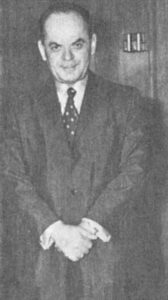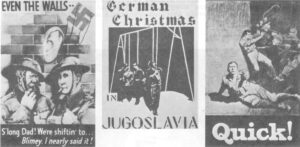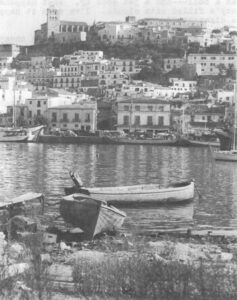January 10, 1973 Athens
 The Prime Minister of Greece, the Regent, the Minister of Foreign Affairs, and the Minister of Defense in a rare group photograph.
The Prime Minister of Greece, the Regent, the Minister of Foreign Affairs, and the Minister of Defense in a rare group photograph.
With Coke and Pepsi, the “smile”-button has come to Greece.
They have appeared — those yellow ovals with the supine parenthesis — everywhere in Athens. In the cafes and ministries, on the wharves and in the streets, disembodied grins enforce an invisible optimism carefully programmed by the government and gently amplified by corporate investment from abroad.
As the radio voice says with ubiquitous insistence, “Esso-Pappas cares for you; Esso-Pappas cares for you.” The message nags on in the head long after the commercial has ended, and one finds oneself repeating it over and over in a silent, unintentional pseudo-reverie.
Optimism is the by-word of the Greek regime.
According to the folks at the Ministry of Press and Information — a “must” visit for every foreign journalist — everything is dandy. Torture is down, and the GNP is up. Students have elected their own representatives, the press is free, foreign relations improve, political resistance dwindles, martial law is temporary, and further “liberalizations” are expected in the near future.
Indeed, one leaves this Ministry with a song in the heart and a new spring to one’s step. There is a temptation to buy ouzos all ‘round for the plainclothesmen who loiter with great diligence on Constitution Square.
But there are those awful buttons nagging away like Cheshire cats banged out on an assembly-line, mechanical grins from the dimestore….
To question this officially-inspired optimism in print is, as the Ministry of Press and Information calls it, to succumb to the temptations of “yellowist New Left journalism.”
Having advertised that caution, it can be reported that both good news and bad news emerges from Greece.
First, the good news: free student elections, in a climate of mutual confidence and good will, were recently held with the blessing of the Greek government. The elections, as predicted, went smoothly.
Now the bad news: the elections weren’t free; they didn’t go smoothly; there was little good will and less mutual confidence.
This was unfortunate on several grounds, but it must have been particularly disquieting for Greece’s leading optimist and Mr. Everything, Prime Minister George Papadopoulos. And it must have hurt him, too, because Papadopoulos cares about students and young people.
Really cares.
A substantial part of the junta’s attention and resources have been devoted, since the 1967 coup, toward re-structuring the educational system and winning, if not the loyalty, at least the diffidence of Greek youth. Toward this end little effort has been spared.
Education has become virtually free since the coup. School texts have been expanded and completely re-written. The texts are distributed gratis to all students. A massive investment in the country’s educational “plant”’ has been made, with top priority going to the development of industry-oriented, specialized technical training schools. Student loans are much more widely available than ever before. Social security benefits are available to all students. Student meals have been subsidized by the government, and large discounts on movie and theater tickets have been established for the young.
As the Minister of Coordination, Mr. N. Makarezos, explains, “The Government has clearly fixed, on a permanent basis, the organisational framework in each stage of education…and has ejected from the Temple of Education all those underminers of the cultural purity of Greek children. In addition, great success has been met in dealing with such a particularly serious and negative factor as the exploitation of the spontaneousness and anxiety of youngsters, with the purpose of turning Greek youth into anti-social instruments of party strife.”
Despite these efforts, numbers of spontaneously anxious youths remain skeptical.
One youth with whom I spoke — a law student employed part-time in a government ministry — seemed typical of the average Greek student whose distaste for the regime is tempered by pragmatism and dreams of emigration.
“Yes,” he said, “it’s true that education is completely free. The textbooks cost nothing. Of course,” he added, “you get what you pay for. Which is to say: almost nothing. The books have all been re-written, but that is no improvement. Today they are four times as thick as they were before the coup, but they don’t contain any more information. They’re simply pompous and less readable. Really, one gets lost in such sentences.
“The schools were poor before the ‘Revolution,’ but they are worse now. So many of the best professors have been dismissed, and the atmosphere was — well, pleasanter before the coup. Personally, I’m not political; very few students are. Still….”
Did he vote in the recent elections? The question makes him laugh.
“No, of course I didn’t vote. There were certain difficulties involved in registering,” he explains coyly. “And besides, the elections were nothing. They were a bluff. I met some of the people who were elected to the student boards. You wouldn’t believe what they are like. They reminded me of my co-workers at the Ministry. They’re like robots, senile and ultra-conservative in a non-thinking way. You know, during the Summer, to earn extra money, I play in a Rock band. Because of this when I come to work at the ministry my co-workers make stupid jokes. ‘0h,’ they say, ‘we’re being invaded by the ye`—ye` generation.’ It’s so hypocritical. Well, when I get my degree I’m leaving Greece. I’ll go to England or America, wherever I can get a job, and let my hair grow down to my chest and never shave.”
According to Andreas, the student I’ve been quoting, that is the goal of most young Greeks: emigration.
“The young people want to leave,” he says, “especially the educated ones. There is an exodus of youth from Greece, and it has caused great concern in the ministries. Perhaps, in 20 or 30 years, we’ll be a nation of old men. There are no exact reasons for this; it is simply a fact. Everyone I know wants to study abroad, or talks about going to work in France or Germany. There are plenty of jobs here — the economy is in very good shape, thanks to American investment. But we want to get out. We can’t breathe here. Of course, this is one of the reasons why students are not more active politically: if we get into trouble with the police, our passports are taken away. And then we have to remain in Greece. A terrible fate, I think.
“But listen. If you are going to write about Greek students, this is what you may say: the students are asleep. They think, but they do not act. They are afraid to speak to each other about politics because they will be reported. There is, little organized resistance. In fact, most of us don’t think seriously about politics. The question is absurd. Does a dead man think about eating? The situation is the same. Still, this may be changing. A little bit, anyway.”
The students I met in Greece — through accidental encounters in cafes or by carefully arranged meetings away from public view — unanimously held the Papadopoulos regime in contempt. The most favorable thing a student said to me about the regime was that “It isn’t so bad, really.”
Resistance, however, is difficult. Contrary to the junta’s propaganda machine, Greece is a police state. One-third of the population lives under martial law five years after the coup. Sixty Constitutional provisions remain under suspension. People are, in fact, followed. Telephones are generally assumed to be tapped, and people are still being arrested for their political views. There is convincing evidence that torture continues to be used, especially by the military police. The press is rigidly controlled despite the ostentatious criticism of the English-language Athens News. More than 300 political prisoners remain in jail, some of them in the literally medieval dungeons of Corfu. A sophisticated and all-pervasive propaganda network relentlessly extolls “the great strides forward” made by the government.
In this atmosphere it is nearly impossible for politically-concerned Greek students to organize meaningful opposition to the government. The schools are beset by informers and the regime quietly encourages the notion that “the walls have ears.” For students to discuss resistance among themselves is to risk court-martial under the notorious Law 509. Numerous trials, followed by draconian sentences meted out to young people, have adequately established the dangers involved in dissidence.
What is surprising, then, is not that most Greek students avoid politics, but that so many do not.
The student elections, held in November, were brought about by a variety of factors, not the least of which was European pressure for evidence of liberalization. But more importantly, the elections came to pass because the students agitated vigorously for them and because the students constitute a palpable threat to the regime.
In the past two years Greek students have become increasingly restless. They have organized to sign petitions protesting the government’s appointment of pro-regime youths to student union offices. There have been demonstrations in the streets, and they have been getting larger and more frequent. There has been an increase in politically-motivated bombings, and underground leaflets have appeared at soccer matches to attack the government with uncompromising prose. Despite the risks, small student-dominated groups continue to organize in behalf of a return to Greek democracy.
The situation has become serious enough that the regime, besides its efforts to appease youth, has reversed its strategy for dealing with dissenters. As one government official privately explained, “Before, we were opening cases and making examples of people. Now, we’re closing cases. We don’t want large trials, and we don’t want a lot of indictments. We want order, not martyrs.”
The recent elections meant different things to the students. For a few, they represented an opportunity to ingratiate the government and further their private ambitions. For many the elections seemed overtly faked and therefore irrelevant. For some they were a brutal imposition.
For the regime, the elections must have seemed unprofitable. Rather than appeasing the students, the elections had an opposite effect. Many youths who previously ignored politics became politicized by the gross manipulation of the candidates, the registration procedures, and the balloting itself. This was especially true of those who came of age after the 1967 coup: it was their first election and they found themselves to be disenfranchised.
The rigging began long before the elections took place. General Security Police methodically intimidated large numbers of students, paying particular attention to the children of pre-coup politicians, to youths who spoke out against the regime’s hand-picked candidates, to election officials, and to others who were either sufficiently brave or foolhardy enough to attract official attention to their critical views.
According to an Athenian close to the student movement, “The police strategy was to terrorize the students into submission. It was worst in Athens and Salonika, and it worked like this: A group of students, 20 or so, would be collectively brought before various faculty committees, told that they had been identified as subversives, and therefore were subject to expulsion from school. These students were then warned to be ‘careful’ in the future, and let go.
“A second group, composed of six or seven students, would be brought into General Security Police headquarters. The police would inform them that they were suspected of subversion. The police would slap them around — not too seriously in most cases — and finally force them to sign a loyalty oath endorsing the regime. They would then be released.
“A third category came in for the worst of it: a few students were picked up, taken to police or military headquarters, tortured for a day, and then released. It was expected that they would tell their friends what had happened, and fear would be spread.
“This pattern was repeated over and over.”
One young girl described the second procedure from personal experience.
“On November 8 (three weeks before her school’s scheduled elections) I received an invitation from General Security of Athens telling me to visit Policeman K. about a case concerning me. I asked the police messenger what it was about, but he only replied that I ‘ought to know.’
“I arrived at the office I’d been sent to and was told to wait. After awhile, Mr. K. came and took me into his office; he asked me in an insulting way whether I was enrolled in the university in order to get a degree or to ‘encourage syndicalism.’
“I told him I wanted to be cultured and to have a degree, but that I also thought it was my responsibility to be involved in public affairs.
“Mr. K. then called me a whore, and showed me a newspaper clipping from Ta Nea. It was a column of letters with signatures of members of the Committee of General Assembly at my school. The Committee was organized to oversee election registration, and our letter protested irregularities. Mr. K. screamed at me, ‘What kind of illegal activities are these?’
“I told him that the Committee was utterly legal. He replied to that by slapping me twice across the face, and then he sat down. I threatened to inform the public prosecutor of what he’d done, but he only shrugged and said he didn’t care.
“There was another, very old, man in the room and throughout this he kept repeating what Mr. K. said and repeatedly calling me names.
“Mr. K. then described me as ‘an anarchist’ and wanted to know why I’m a member of the Committee of General Assembly. He didn’t let me answer, but said that if he saw my name in the paper again, held have me brought before a military court, expelled from the university, and beaten.
“I asked him what charge he would bring.
“Then, without any warning, a door to my left burst open, and a man rushed in. He grabbed my hair and began punching me in the face. He threw me to the floor, picked me up by the hair, and continued punching me in the mouth, on my head, and around my ears.
“I started crying. I was numb. My eyes dimmed and there were rushes of pain. The man who was beating me was tall, thin, and young, with black hair and green eyes. I don’t know who he was, but I’d recognize him anywhere. He was beating me with such passion, calling me these foul names. I became dizzy and lost track of time. Everything was spinning. I fell down over and over, but he kept hitting me and dragging me around the room by my hair. The others, Mr. K. and the old man, watched indifferently.
“Finally, they intervened and took the young man away. I sat down. Mr. K. returned and offered me a cigarette.
“My disgust was complete; I burst into tears.
“Mr. K. returned to his threats about taking me before a military court, and having me expelled.
“I couldn’t see out of my right eye by this time; I was very dizzy, and my head hurt badly. I asked K. if he thought the University’s Rector would expel me for being a member of a legal commission.
“He became furious again, and started shouting. ‘Come to earth, bitch! We decide, and the others just determine the penalties.’ I suppose he meant the Rector and the military courts.
“I didn’t say anything. Then K. started asking about my father and what he did for a living. He called me an anarchist and communist, and began insulting the Committee of Control. I told him that we’re just simple students, and that was a mistake, because I used the demotic expression.
“K. became even more furious. I expected the door on my left to burst open again, but it didn’t. He wanted to know who I read that I should use the demotic form, and I told him that everyone uses it, that it is the only form of Greek that is alive outside of books.
“K. warned me I’d be taken to ‘another office.’ He made it sound very menacing. Then we went to this second office. In there was another young man. He was tall and blond, with gray eyes. K. told him that I’d spoken defiantly. I replied that I hadn’t, that I’d been scared out of my wits, and spoken gently. I told him of K.’s foul mouth and of the beating. The new man then said that I needed another beating.
“This new man was very strange. He spoke with exaggerated formality, repeating K.’s comments and threats. He kept alternating his voice between anger and sweetness — it was tragi-comic.
“In fact, I wasn’t beaten again. After yelling at me some more, I was led away and photographed. Then they let me go home.
“It was a costly visit. I’d been severely bruised about the head, and my hip and knee had been badly kicked. I’ve been seeing doctors since then because I’ve had continual headaches ever since, and I get suddenly dizzy quite often and lose the sight in my right eye.”
The campaign of intimidation was not always a private affair. In Salonika, an entire regiment of Greek Marines, dressed in civilian clothes, burst into a student assembly, screaming wildly, and demanding, “What do you want! These are our elections, not yours!”
Indeed, ex-students and students in the military reported that some army units received written orders telling them which university meetings to disrupt and how to go about it.
The intimidation didn’t abate as the elections grew closer. On the contrary, prominent students in Athens and Salonika were arrested, jailed without explanation, and held incommunicado for long periods of time. Some candidates for election to the student boards were taken to police headquarters and ‘persuaded’ to withdraw in favor of the regime’s candidates. Others simply found their military deferments cancelled abruptly and orders calling for their immediate induction into the army. Attendance at student assemblies was swelled by the presence of beefy “observers” and plainclothes police bearing student and press identification. On at least one occasion these ersatz -students and -journalists united to make 10 arrests during a turbulent student meeting.
The election itself was bizarre and, occasionally, entertaining.
In order to vote, students had to register beforehand. This proved easier said than done. In Salonika, the voting lists were opened for a matter of minutes, sufficient time for only 300, allegedly ‘selected,’ students to register (out of 12,000). Elsewhere, registration took place less than 48 hours before the election, and the ‘competent authorities’ in charge of the procedure several times published the wrong hours for registering. Moreover, registration officials often proved difficult to locate even when the offices were actually open. On several campuses, students organized search parties to seek out and confront registration officials who had disappeared from the scene.
If there was ever any doubt that the elections’ purpose was primarily to bolster the dictatorship which permitted them, Undersecretary of State Byron Stamatopoulos made the point explicit.
In a speech to the students of Patras University, Stamatopoulos (the junta’s official spokesman) said, “You were promised that you could choose your own representatives and the promise stands. But some of you who initially ridiculed the promise have taken advantage of it to try and obstruct the procedure of the elections. This will not be allowed. Calmly, but steadily — since the Cabinet always keeps its presence of mind in the face of provocation — your representatives will be elected through your own free will, but not under the pressure and the influence of those who insist upon dreaming of a past to which the country will never return.”
Stamatopoulos then revealed that students elected to represent their classmates would be required to meet weekly with him for consultations on student issues “and such problems as may arise.” Despite the government’s good will, the Undersecretary said, some students still believed that student and government interests are somehow divisible.
One such student, a candidate for election, was appalled at the idea of weekly conversations with the government, Stamatopoulos said. No sooner had the Undersecretary introduced himself, he reported, than the candidate said, “It is not a pleasure for me to speak with you.”
Stamatopoulos responded, “But if you are elected I shall call you at least once a week to talk over the problems of your fellow students. Can you tell me anything about these problems now?”
The student replied that he had nothing to say to Stamatopoulos, and had no intention of becoming part of the government’s machinery.
Election day itself was more discordant than had been expected, despite the regime’s careful preparations.
On one Salonika campus, armed commandos held martial exercises less than 200 yards from the balloting. According to a student who witnessed the scene: “The voting was going on in the middle of what seemed to be a war. The army was charging around, shooting at itself with blanks. The noise was tremendous and, I think, the message was clear.”
At the Athens University Law Faculty, the student council demanded certain safeguards to assure the elections’ honesty. They asked, for instance, that members of the student council be allowed to observe the voting, and that ballot boxes be opened in the presence of a cross-section of students. The demands were refused, and the students promptly announced a boycott of the election. Following that announcement, a few hundred students took to the streets in a demonstration characterized by such anti-government slogans as “Freedom” and “Free elections!” Meanwhile, other students occupied the building in which the elections were to occur. The demonstration and the occupation were dispersed by police who fought with the more incorrigible youths. Thirty or more arrests were made.
The elections in Salonika were also boycotted as students protested the “irregular” registration procedure and the presence of security officers both inside and outside voting booths.
In one school a student exactly predicted his school’s election results. He was able to do this, he explained, because he had found a package of marked ballots with the final result already tallied upon them. This feat was accomplished hours before the balloting ended.
The embarrassments did not finish with the elections themselves.
Deacon Timotheos Lagoudakis, a third-year student in the Theological School of Athens University, was a candidate for his school’s student board. Lagoudakis grew suspicious of the elections when he learned that members of the government-appointed Election Supervisory Committee were registering right-wing students days after the registration procedure had officially ended. Suspecting that the fix was in, Lagoudakis asked that a representative of his be allowed to sit in on the ballot-counting. This request was refused even though members of the Election Supervisory Committee, which counted the ballots, were themselves candidates for election. They could hardly be considered impartial.
The suspicions of Lagoudakis were confirmed by the election’s results.
Three days after the final tally, Lagoudakis produced a document signed by 42 students, each of whom swore that he was registered and had voted for Lagoudakis. How is it then that Lagoudakis was credited by the Election Supervisory Committee with receiving only 28 votes?
Moreover, the Greek priest said, he could produce even more signatures of constituents whose ballots had gone uncounted. Despite the blunt veracity of the priest and the signatories to his protest (signed in “full cognizance of the Law about False Statement”), Lagoudakis’ complaint brought no re-count.
When it was over, the election had provided only two surprises.
The first surprise was that in two Athens Polytechnic schools, the elections were held in an open atmosphere. The registration of would-be voters contained few of the irregularities so prevalent elsewhere, and the balloting was supervised by “committees of mutual trust.” Candidates were neither harrassed nor manipulated by regime functionaries or police. The result in those two schools was that 13 of 14 elected candidates describe themselves as “anti-pro-regime” (a neat characterization that affords some subtlety of interpretation).
The second surprise was that so few students actually voted: 19.66 percent. With the entire country disenfranchised for more than five years, it was expected that the students would greet their new right, or privilege, with enthusiasm. The opposite proved to be true.
When the scope of the student demurral became public, pro-government newspapers filled their editorial pages with the carefully articulated shock of regime bureaucrats, and suggestions for overcoming the disinterest of the youth.
But the government’s surprise must have been as phoney as a 4-drachmae bill. The regime had spent millions over five years cultivating precisely the apathy that the elections proved. No effort was spared to inhibit dialogue prior to the elections, and both registration and supervision of the elections were ostentatiously partisan. To vote one had to be either naive or prone to futile gestures. Under the conditions that prevailed, even a pro-government vote was superfluous, a waste of time.
What this suggests is that the student elections may have been a trial balloon, an index to measure the safety with which a controlled general election might be held in the near future. If such a general election is to be held — and the advantages to the regime’s domestic and international image must be obvious — then it is likely that the same pattern of rigging and intimidation will precede it as preceded the student election. Papadopoulos has repeatedly asserted that his work “is not yet done,” and it is safe to assume that he will not allow any elections to be held that might terminate his employment.
The apparent apathy (or discretion) of Greek studentdom is focused, and not diffuse; it has more to do with prudence than with disinterest or ignorance. Within this frame of reference the students generally share the same perspective and are remarkably homogenous in their attitudes and aspirations.
The perspective is a cynical one that finds its outlet in wit, sport, dalliance, and study. Indeed, while it is fair to say that these are black days for Greek democracy, it is a golden era for puns and footballs.
Anti-government jokes provide the ballast to Athenian conversation among both sophisticates and workers. Laughing at the regime has, with soccer, become something of a national pastime. While soccer has always been popular in Greece, it has never been so much so as under the colonels. In a real, and direct, sense the sport has replaced the people’s interest in political debate.
Where big-city newspapers were formerly filled with political news, analysis, gossip, and speculation, they are now jammed with the same kinds of reports on soccer. No detail of the sports’ world is beneath the notice of the press or the public.
The government is largely responsible for this athletic escalation. With considerable ideological obfuscation characterized by nationalistic appeals to Greek “purity” and tradition, the regime has massively subsidized local sports. A Five Year Plan involving billions of drachmaes, and a proliferating sports bureaucracy, has transformed the nation’s recreational facilities and, to a considerable extent, its consciousness.
From 1967 through 1970 (the most recent years for which statistics are available) the government boasts construction of 161 stadia, 17 swimming pools, 20 youth centers, 4 shooting-ranges, and more than 600 gymnasia. Soccer players, like other popular athletes, are among the highest-paid, professionals in the country, earning an average wage (with fringes) that is four times higher than that paid journalists. Sports clubs and related associations have received an 800 percent hike in government subsidies since the coup, and special schools have been established as part of a crash program to train coaches and athletic instructors. The list of accomplishments goes on, and the political vacuum created by the colonels is filled with bouncing balls.
It is possible that the junta’s interest in promoting athletic circuses is philosophical rather than political. But that is highly unlikely. Virtually everything Papadopoulos does is motivated by his desire to remain in power, to identify his personal interest with the public interest. The attention he devotes to the youth of Greece, manifest in the massive outlays to re-design Greek education and promote athletics, is an integral part of what amounts to a pacification campaign.
There are both general and special reasons for pacifying Greek youth. Numbering more than 80,000, the students come from a relatively homogenous upper- and upper-middle class background — the same sources which have proved most recalcitrant to the regime. Moreover, political activism is a tradition among Greek students, and that activity has usually assumed the character of opposition to the status quo. It was reasonable of the junta — who came to power during a peak of European student unrest — to pay special attention to the schools.
Equally importantly, the student world was one of the few milieus that could be depended upon to regenerate itself following the initial attack upon it during the night of April 21, 1967. It was on that night that “the colonels” used a NATO contingency plan to seize power. In doing so, they metaphorically decapitated every sector from which political resistance might be expected. Neither the Right nor the Left, nor even the Center, was spared.
The effect of the mass arrests (more than 10,000 during the first week of the coup) is still felt. While the vast majority of political prisoners have been released from prison (some 360 remain jailed), those released have been disenfranchised, impoverished, intimidated, and isolated from whatever power base they may once have held. As one recently released prisoner told me, “The walls of the prison have only been pushed outward; Greece itself has been made a kind of concentration camp.”
The students, by virtue of their innocent age at the time of the coup, remain relatively intact and capable of serious opposition to Papadopoulos. They have the leisure and the inclination to think critically. They have a sense of solidarity among themselves, and their population is large enough to cause meaningful disruption. Moreover, they sympathize with the rebellious culture of Western youth elsewhere, and share the same combustible nature that has characterized the outbursts of their counterparts in France, Germany, England, Mexico, Holland, Italy, and the United States.
It is no wonder that they have been treated like a powerful tribe whose favor must be curried; their explosive potential is substantial and, while their power is limited and inadequate by itself, the students could easily be a decisive catalyst in giving birth to a movement with a broader base. The dissatisfaction of the Greeks is not far from the surface, and its emergence could conceivably be brought about by the young.
In its effort to defuse the student movement, the regime has had mixed results. It has failed miserably in its attempt to make converts of the young; the best it has been able to accomplish in this area is to successfully bribe a few students, and reduce a large percentage of the remainder to a kind of cantankerous indifference.
What the regime has accomplished is the succeasful destruction of potentially volatile student institutions. In the process it has also curtailed open criticism and limited the areas of legitimate student inquiry to those which are politically innocuous. What student institutions remain (such as the recently elected boards) are mostly irrelevant.
But despite the regime’s attempt to anaesthetize the students, they continue to be an important part of what has come to be the Resistance.
An Athens lawyer active in the Resistance recently offered another reason for the junta’s failure with the students. “The regime’s mistake,” he said, “is in their timing. They wait for a hostile situation to develop before they act. Their strategy is purely defensive. If they had held the student elections in 1971, before the protests by the students had begun, the beatings would have been unnecessary, and the ‘student problem’ would not now exist. In 1970, and even in 1971, the students might well have supported the regime without coercion. Now, there is no going back. The regime has blundered.
“But,” he went on regretfully, “Greek resistance is still not effective. There are essentially three reasons for this fact. One, there is too profound a discrepancy in the resources of the people and of the government; that is, the government has both the guns and the required lines of communication — the people are without both. Two, there is now no political organization, no infrastructure, for opposing the regime from within Greece. And finally, the leadership of the Resistance has made the mistake of expecting the regime to fall of its own accord — of relying upon foreign pressures that have never really materialized as fully as we expected.
“The result is that the Resistance has been led by persons whose strategy has lagged behind that of the people themselves. The terrible irony of Greek resistance is that the burden of opposing fascism has fallen upon the bourgeoisie — the upper classes, intellectuals, former politicians, artists, professionals, and students. Today the students offer the only possibility for an organized and meaningful resistance to the regime. But, while they offer the best opportunities for organization, they are not in themselves adequate to topple the government. They simply don’t have the strength.”
Pausing to sip an ouzo, he added, “Despite that, I’m optimistic. But I don’t know why.”
Received in New York on January 19, 1973
©1973 Jim Hougan
Jim Hougan is an Alicia Patterson Foundation award winner on leave from The Capital Times (Madison, Wisconsin). This article may be published with credit to Mr. Hougan, The Capital Times, and the Alicia Patterson Foundation.









